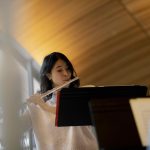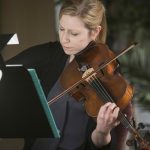We enlisted Sara Wilson and Kaitlyn Semborski of Library Outreach and Communications, who help with planning these
performances, to interview Anne Harlow, which they recorded on November 2, 2020. As Anne herself acknowledges, Beyond the Notes is a group effort that enlists the help of library and facilities staff and, of course, the extraordinary faculty and students of the Boyer College of Music and Dance. Kudos to all those who have contributed to making these performances so memorable.
From Paley to Charles to Zoom World, Beyond the Notes has wrapped performance, books, ideas, and pleasure into a singular experience that enriches the university and demonstrates the centrality of the modern academic library. Since this interview, Beyond the Notes has been as busy as ever, with the following programs. The show must go on!
- Currents (11/18/2020)
- Unending Music (12/2/2020)
- 20th Century Vietnamese Piano Music (2/10/2021)
- Music for Piano and Mandolin (3/3/2021)
- The Prince and the Elephant (3/24/2021)
- Music by Elisabeth Jacquet de la Guerre (4/14/2021)
If you missed any of these programs, check out these recordings and visit the Charles Library website for news and updates on future Beyond the Notes performances.




